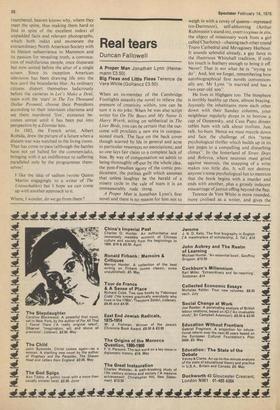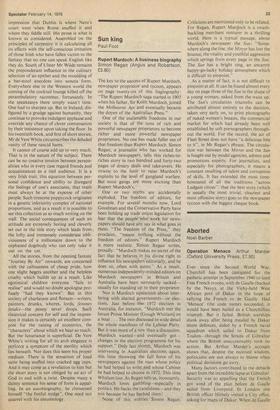Real tears
Duncan Fallowell
A Proper Man Jonathan Lynn (Heinemann £3.50) Big Fleas and Little Fleas Terence de Vere White (Gollancz E3.50) When an ex-member of the Cambridge Footlights assaults the novel to relieve the pressure of creativity within, you can be sure it is no joke. When he was also script writer for On The Buses and My Name Is Harry Worth, acting on sabbatical in The Liver Birds, you can be certain that the outcome will proclaim a new era in commassioned murk. The face on the back cover though scarred by life in general and acne in particular resurrects no associations; and so one lays fair claim to a complete lack of bias. By way of compensation we admit to being thoroughly off-put by the whole idea, the post-Freudian agony of the comic predicament, the puritan guilt which assumes that unless laughter be the herald of a misery cycle in the vale of tears it is an immeasurably rude thing.
A Proper Man is Jonathan Lynn's first novel and there is no reason for him not to
weigh in with a covey of queens—repressed (ex-Dartmoor), self-abhorring (Arthur Rubinstein's stand-in), overt (reginus in situ, the object of missionary work from a girl called Charlottc)—chasing each other round Truro Cathedral and Mevagissey Harbour. It sounds splendid already, a gay farce in the illustrious Whitehall tradition, if only his touch is feathery enough to bring it off. Never! That is not what he is "trying to do". And, lest we forget, remembering how autobiographical first novels conventionally are, Mr Lynn "is married and has a two-year-old son".
He lives in Highgate too. The biosphere is terribly healthy up there, almost bracing. Joyously the inhabitants mow each other down with their Sunday columns, your neighbour regularly drops in to borrow a cup of Ouspensky, and Casa Pupo dinner tables hum with talk about troilism. Just talk, ho-hum. Hence we must muzzle down and face the challenge of this "tense psychological thriller which builds up in its last pages to a compelling and disturbing climax". In the hinterland of Strait. Dogs and Rebecca, where neurosis must grind against neurosis, the snapping of a wrist makes too little din. It will not destroy anyone's tense psychological fun to mention that the book begins with a murder and ends with another, plus a grossly indecent miscarriage of justice offing beyond the flap.
Terence de Vcre White is more rounded, more civilised as a writer, and gives the impression that Dublin is where Nero's court went when Rome snuffed it and where they fiddle still. His prose is what is known as considered. Assembled on the principles of carpentry it is calculating all its effects with the self-conscious irritation of those Irish who have fallen victim to the fantasy that no one can speak English like they do. Southt of Ulster Mr Wilde remains the preponderant influence in the culinary selection of an epithet and the moulding of a bar-stool anecdote into sonata form. Everywhere else in the Western world the coming of the cocktail lounge killed off the perambulatory raconteur, fortunately. In the speakeasys there simply wasn't time. One had to sharpen up. But in Ireland, disfigured by a grudge against humanity, they continue to provoke indulgent applause and override any chance of clever conversation by their insistence upon taking the floor. In his twentieth book, and first of short stories, Mr de Vere White circumscribes the deluded vanity of these rancid hams.
It cannot of course add up to very much. That is in the nature of the subject. There can be no creative tension between personalities who in every case regard friends and acquaintances as a tied audience. It is a very Irish trait, this equation between personal confidence and ability to disregard the feelings of one's associates, that truth must always be at the expense of other people. Such tiresome poppycock originates in a genetic inferiority complex of national proportions, and as a result it is possible to see this collection as so much writing on the wall. The social consequences of such an attitude are extremely boring and cleverly set out in the title story which leads from. the lofty and immensely considerate obliviousness of a millionaire down to the orphaned dogsbody who can only take it out on the cat.
All the stories, from the opening fantasy "Journey By Air" onwards, are concerned with the callousness of cheap pride, how one slight begets another and the helpless cruelty which builds up as a result. Like egotistical children everyone "fails to realise" and would no doubt apologise profusely "had they known". But in this society of charlatans and flotsam—writers, painters, drunks, whores, lords, femmes fatales—the penny never drops. Such theatrical concern for self and the impression it makes is certainly an excellent compost for the raising of eccentrics, the "characters" about which we hear so much. But the luxuriance is superficial. De Vere White's writing for all its arch elegance is perforce a symptom of the sterility which lies beneath. Nor does this seem his proper medium. There is the sensation of loud satin being stuffed into cracked egg cups. And it may come as a revelation to him but the short story is not obliged by an act of God to end with a twist. Despite many a dainty sentence his sense of form is appalling. In an autobiography, he christened himself "the fretful midge". One need not quarrel with his entomology.



































 Previous page
Previous page